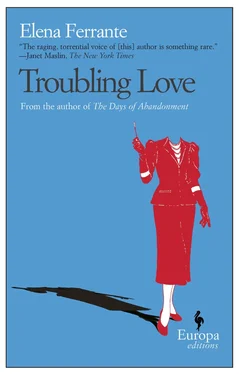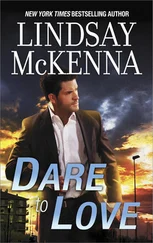I began to hurry, in order not to lose sight of him, but to do so I was soon forced to abandon any attempt at shelter and move into the open, into the rain, since all the passersby had crowded into doorways, into the fronts of shops, or under cornices and balconies. I saw Caserta hop to avoid plants and vases of flowers displayed on the sidewalk by a florist. He didn’t make it, stumbled, ended up against the trunk of a tree. He stopped for a second as if he were pasted to the bark, then tore himself off and began running again. I don’t know what he was afraid of. I imagined that he had seen my uncle and had taken off. Maybe the two old men were reproducing as if in a game a scene already played when they were young: one pursued, the other fled. I imagined them coming to blows on the wet pavement, tumbling in one direction, then the other. I didn’t know how I would react, what I would do.
At the intersection of Via Scarlatti and Via Luca Giordano I realized that I had lost him. I looked around for Uncle Filippo but didn’t see him, either. So I crossed Via Scarlatti, which had become a long question mark of stopped vehicles, to Piazza Vanvitelli, and began to hurry back along the opposite sidewalk to the first cross street. There was thunder but no visible lightning, and the thunderclaps were like dry rips in a piece of fabric. I saw Caserta at the end of Via Merliani, whipped by the rain under the metallic blue and red of a big sign, against the white wall of the Villa Floridiana park. I ran after him but a young man came suddenly out from the shelter of a doorway, grabbed me by one arm, laughing, and said to me in dialect, “What’s the rush? Let me dry you off!” The tug was so strong that I felt the pain in my collarbone and slipped on my left leg. I didn’t fall, only because I hit a garbage can. I regained my balance and pulled myself free, shouting, to my own amazement, insults in dialect. By the time I, too, had reached the boundary wall of the park, Caserta was almost at the top of the street, a few meters from the funicular station that was being renovated.
I stopped with my heart in my throat. He now advanced, without running, along the row of plane trees, between the cars parked on the right. Still bent double, he was struggling, with an endurance in his legs one would not have suspected in a man of that age. When it seemed that he couldn’t take another step, he leaned panting against the barrier surrounding a construction site. I saw his body contort, ending up in a position in which a bar of the scaffolding appeared to be emerging from his white hair. On it hung a sign: “Demolition and reconstruction of the Piazza Vanvitelli station — Funicular of Chiaia.” I was certain that he wouldn’t have the strength to move, when again something alarmed him. With his shoulder he struck the wall of the enclosure as if he wanted to break it and escape through the breach. I looked to the left, to see who was frightening him: I hoped it was my uncle. It wasn’t. Coming from Via Bernini, in the rain, was Polledro, the man from the Vossi shop. He was shouting at him and now he gestured at him to stop, now pointed threateningly with his palm outspread.
Caserta hopped from one foot to the other, looking around for a way out. He seemed to have decided to go back down along Via Cimarosa, but he saw me. Then he stood still, smoothed his hair, and seemed suddenly ready to confront both Polledro and me. He walked with his back to the enclosure of the construction site, then against a parked car. I, too, began to run, just in time to see Polledro move, as if he were skating on the metallic gray of the pavement, a massive yet agile figure against the scaffold of yellow-painted iron bars placed at the entrance of Piazza Vanvitelli. But it was at that point that my uncle reappeared. He emerged from a pizzeria where he had taken shelter. He had seen me arrive and now was running after me stiffly, with quick little steps in the rain. The man from the Vossi sisters’ appeared in front of him, and they ended up, inevitably, colliding. After the collision they held each other by the arms, each trying to help the other stay on his feet, and in that way rotated, seeking a point of balance. Caserta took advantage of this to dive into the white light of Via Sanfelice, in the sparkling rain, amid the crowd seeking shelter in the entrance to the funicular.
I gathered what energy I had left and ran after him, into a place thick with people’s breath, muddied by the rain, grimy with plaster dust. The funicular was about to depart and the passengers pushed and shoved one another toward the ticket-taking machines. Caserta was already beyond them and was going down the steps, stopping frequently, craning his neck to look behind him, and then suddenly bringing his flushed face to whoever happened to be walking next to him to whisper something. Or maybe he was talking to himself but in a voice that he tried to keep low, waving his right hand up and down with three fingers extended and thumb and index finger joined. He waited for a few seconds, in vain, for an answer. Finally he started down again.
I got a ticket and rushed toward the two luminous yellow cars. I couldn’t see which one he had gone into. I went halfway along the second car without finding him, and decided to get on, making my way through the crowd of passengers. The air was heavy and smelled of sweat and wet clothes. I tried to find Caserta. Instead I saw Polledro, who was taking the steps two at a time, followed by my uncle, who was shouting at him. They had just time to get on the first car before the doors closed. After a few seconds they appeared against the rectangle of glass that faced my car: the man from the Vossi shop was looking around in a fury and my uncle was pulling him by one arm. The funicular started off.
The cars were new, very different from those of my childhood. These preserved only the shape, a parallelogram whose entire structure seemed to have been thrust backward by a violent shove from the front. But when the funicular began to descend into the oblique well before it, the squeaks, the vibrations, the jerks returned. Yet the cars on their steel cables slid down the cliff with a velocity that had little to do with the slow, restful pace, punctuated by jolts and thuds, at which they used to run. The vehicle, which had been a circumspect probe under the skin of the hill, seemed to have become a brutal injection into a vein. And with annoyance I felt that it dimmed the memory of those pleasant trips with Amalia, after she had stopped making gloves, and took me along when she delivered to the wealthy clients of the Vomero the garments she had sewed for them. She had dressed and done her hair with care, in order to seem no less a lady than those she worked for. I, on the other hand, was thin and dirty, or at least felt that way. I sat beside her on the wooden seat and held on my knees, carefully arranged so that it wouldn’t get creased, the garment she was working on or had just finished, wrapped in packing paper that was fastened at the ends with pins. The package rested on my legs and stomach like a case that contained the smell and warmth of my mother. I felt it in every inch of skin touched by the paper. And that contact produced in me a melancholy languor marked by the jerks of the car.
Now instead I had only an impression of losing altitude, like an aged Alice in pursuit of the White Rabbit. I reacted by detaching myself from the door and making an effort to get to the center of the car. I was in the highest part, in the second compartment. I tried to advance, but the passengers stared at me in irritation, as if there were something ugly in my aspect, and repulsed me antagonistically. I struggled to move, then gave up and looked for Caserta. I could make him out at the end, in the last section, which consisted of a broad platform. He was standing behind a shabby-looking girl of around twenty. I saw him in profile, as I saw the girl. He seemed a peaceful old man in dignified old age, intent on reading a newspaper gray from the rain. He held it in his left hand, folded in fourths, and with his right he held onto the polished metal grip. But I soon realized that, swaying with the movement of the car, he was getting ever closer to the girl’s body. Now his back was arched, his legs were slightly spread, his stomach leaned against her buttocks. There was nothing that justified that contact. In spite of the crowding, he had enough space behind him to position himself at a proper distance. But, even when the girl turned with barely concealed rage and then pushed her way forward to escape him, the old man didn’t desist. He waited a few seconds before regaining the few inches he had lost, then again joined the blue material of his trousers to her jeans. He received a timid elbow in the ribs but continued impassively to pretend to read, and in fact pressed his stomach against her with greater determination.
Читать дальше












